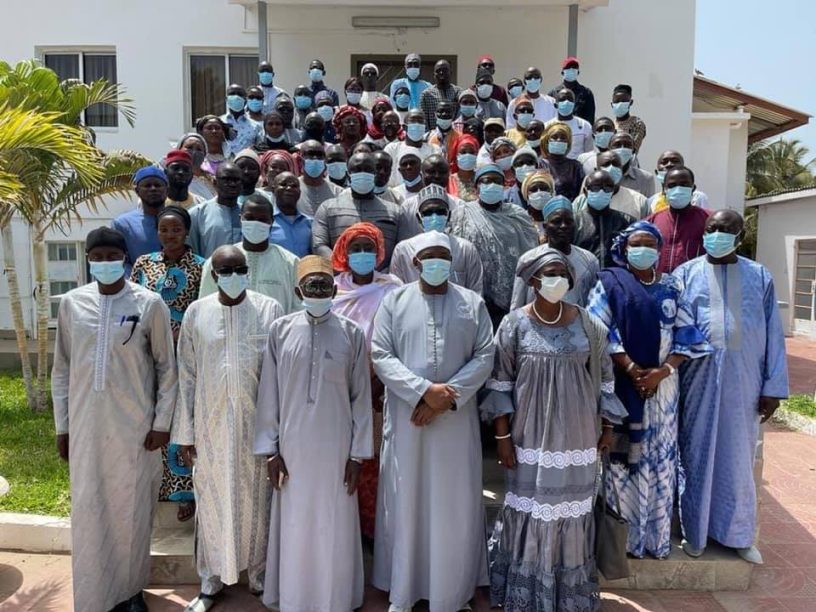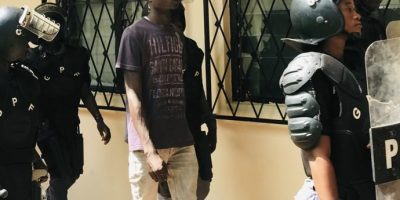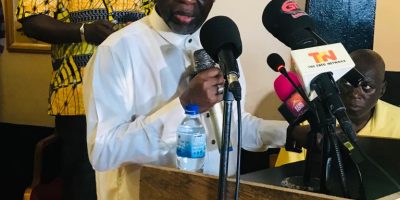 Posted since March 2018 still relevant since the National People’s Party (NPP) unveiled Executive Committee without Christian and faith-based voices in NPP.
Posted since March 2018 still relevant since the National People’s Party (NPP) unveiled Executive Committee without Christian and faith-based voices in NPP.by Alagi Yorro Jallow.
Mahatma Gandhi had once said, to judge how civilized a nation is, look at how it treats its minorities. The Gambia does not make a passing grade going by this yardstick since President Adama Barrow and his coalition government assumed power last year.
Adama Barrow promised his administration would be the most diverse and all-inclusive in Gambian history, comprising more minority than any government before it — which, in many ways, fulfills Adama Barrow and coalition campaign promise to select a team that “looks like The Gambia” and modernizes the predominantly preventing “the Tyranny of the Majority.” Building a diverse team will lead to better outcomes and more effective solutions to address the urgent crises facing our nation and an Inclusive Gambia, which tracks diversity in government.
In most countries, minorities suffer from so-called “horizontal inequality.” While on paper, they may enjoy legal equality, the playing field remains uneven in real life. The Gambia is no different. President Barrow and the coalition team promised to have a diverse administration that reflected the country’s diversity and identity.
Before this administration, President Yahya Jammeh had the most diverse and all-inclusive administration regarding gender, religion, and ethnic identity representation in his administration without any fear of exaggeration historically. It is not just enough to have someone in the literal room where decisions are made. It is about that person’s voice is equal to everyone else in the room.
Historically, one of the challenges to increasing diversity has been a reluctance to make commitments along identity lines. Leaders should not be feared. They would open themselves up for false accusations of choosing people based on demographics instead of merit. Minorities tend to have more extraordinary qualifications because the bar is often higher. When it comes to leadership, political participation of women, politically disabled, people with disabilities in political life in the country, the disparity is more comprehensive. People with disabilities are not well represented in elective office and political decision-making in the Gambia.
Diversity goes beyond demographic identity. Accurate representation is more directly tied to different lived experiences.
Having everybody come from a wealthier majority, privileged background exclusion of minorities in the formulation is problematic even if it is 50/50 women and men. The goal of reflecting Gambian identity is to get parity at every level of government. There is a way to do it if you are intentional. That is a big mantra with those of us in the diversity, equity, and inclusion space. It does not just happen. Too often, people are chosen based on their networks. There must be access and pipeline to these powerful positions for minority groups. Diversity begets diversity.
The most considerable effort this coalition government seen to have done to be all-inclusive with a diverse administration — a push that is long overdue and must continue. We cannot go back to the root of the inequity. It cannot just be a band-aid fix. We have to get to the root of it and open up that wound.
It is worth remembering that ‘Proportional Representation is a crucial enabler of minorities in politics, especially women and Christians whose representation fell too short in elective office since Independence.
Political scientists have agreed for years that PR systems lead to equal gender representation as well as minority representation in parliaments, and a series of studies by political scientists have shown that more women have usually been elected under PR systems than majoritarian systems (Norris, 1985; Matland, 1998; Reynolds, 1999; Kenworthy and Malami, 1999; Siaroff, 2000; Moser, 2001; Salmond 2006
One reason why the issue of minority rights is not on the political radar screen of the government is the absence of their political voice. In most countries, the Parliament is the venue where a nation’s political agenda is discussed and adopted. Giving Christians, women, and other minorities a stronger voice in our Parliament could help put the spotlight on the status of minorities.
A wise man suggested that Christians and women should demand their proportional representation in Parliament. Many countries have it. Why can’t we have the same? (To be clear, Some Asian countries reserved seats for minorities, not proportional representation per se). A similar demand has been made for Asia Hindus, Buddhists, and Christians, which has called for allocating seats for religious minorities.
Many scholars have also embraced the idea of proportional representation. Dr. Nazrul Islam, a Bangladeshi economist, now working with the United Nations, in his new book, Governance for Development (Palgrave Mcmillan, New York 2016), has argued vociferously on why countries should consider switching to a proportional election. Among other things, such an electoral arrangement will enable minority groups to be represented following their numerical strength, rendering the legislature to be more inclusive. “They can pursue their interests and demands more freely and directly, without having to depend on bigger parties.” As a result, he concludes, a proportional election could encourage smaller parties and groups to channel their grievances through Parliament rather than through extra-parliamentary means.
Reserve seats or proportional representation, whatever the course may be, the time has come to consider ways to ensure that The Gambia’s minorities have a voice on matters that matter most to them. Parliament could be the place where this could have its most logical beginning.
 Posted since March 2018 still relevant since the National People’s Party (NPP) unveiled Executive Committee without Christian and faith-based voices in NPP.
Posted since March 2018 still relevant since the National People’s Party (NPP) unveiled Executive Committee without Christian and faith-based voices in NPP.
 Posted since March 2018 still relevant since the National People’s Party (NPP) unveiled Executive Committee without Christian and faith-based voices in NPP.
Posted since March 2018 still relevant since the National People’s Party (NPP) unveiled Executive Committee without Christian and faith-based voices in NPP.


Ma sha Allah great and thanks for sharing